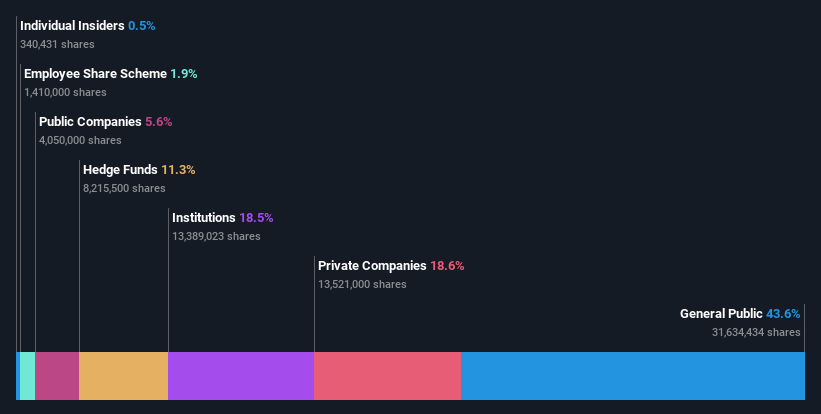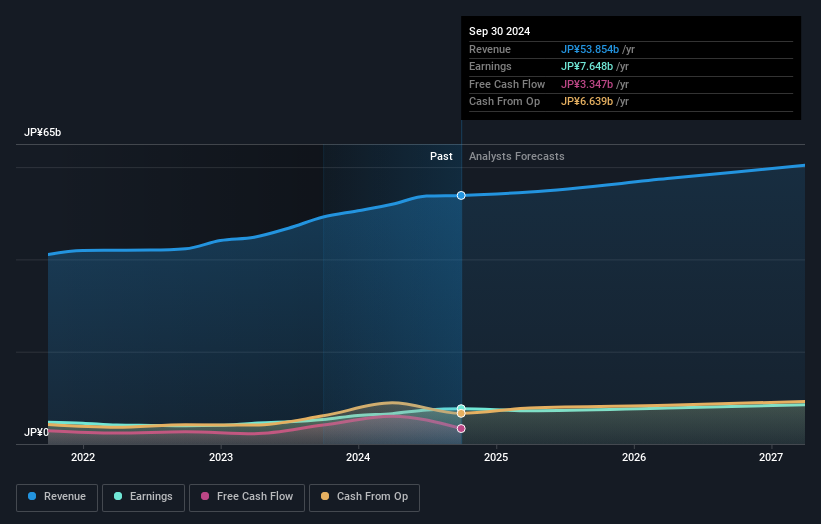Retail investors among Sinko Industries Ltd.'s (TSE:6458) largest stockholders and were hit after last week's 9.5% price drop

Key Insights
- The considerable ownership by retail investors in Sinko Industries indicates that they collectively have a greater say in management and business strategy
- The top 10 shareholders own 51% of the company
- Institutional ownership in Sinko Industries is 18%
To get a sense of who is truly in control of Sinko Industries Ltd. (TSE:6458), it is important to understand the ownership structure of the business. We can see that retail investors own the lion's share in the company with 44% ownership. That is, the group stands to benefit the most if the stock rises (or lose the most if there is a downturn).
As market cap fell to JP¥90b last week, retail investors would have faced the highest losses than any other shareholder groups of the company.
In the chart below, we zoom in on the different ownership groups of Sinko Industries.
View our latest analysis for Sinko Industries

What Does The Institutional Ownership Tell Us About Sinko Industries?
Many institutions measure their performance against an index that approximates the local market. So they usually pay more attention to companies that are included in major indices.
As you can see, institutional investors have a fair amount of stake in Sinko Industries. This suggests some credibility amongst professional investors. But we can't rely on that fact alone since institutions make bad investments sometimes, just like everyone does. It is not uncommon to see a big share price drop if two large institutional investors try to sell out of a stock at the same time. So it is worth checking the past earnings trajectory of Sinko Industries, (below). Of course, keep in mind that there are other factors to consider, too.

Our data indicates that hedge funds own 11% of Sinko Industries. That worth noting, since hedge funds are often quite active investors, who may try to influence management. Many want to see value creation (and a higher share price) in the short term or medium term. Meiko, KK is currently the largest shareholder, with 19% of shares outstanding. For context, the second largest shareholder holds about 11% of the shares outstanding, followed by an ownership of 5.6% by the third-largest shareholder.
We also observed that the top 10 shareholders account for more than half of the share register, with a few smaller shareholders to balance the interests of the larger ones to a certain extent.
Researching institutional ownership is a good way to gauge and filter a stock's expected performance. The same can be achieved by studying analyst sentiments. There is some analyst coverage of the stock, but it could still become more well known, with time.
Insider Ownership Of Sinko Industries
While the precise definition of an insider can be subjective, almost everyone considers board members to be insiders. Management ultimately answers to the board. However, it is not uncommon for managers to be executive board members, especially if they are a founder or the CEO.
Insider ownership is positive when it signals leadership are thinking like the true owners of the company. However, high insider ownership can also give immense power to a small group within the company. This can be negative in some circumstances.
Our information suggests that Sinko Industries Ltd. insiders own under 1% of the company. However, it's possible that insiders might have an indirect interest through a more complex structure. It has a market capitalization of just JP¥90b, and the board has only JP¥421m worth of shares in their own names. We generally like to see a board more invested. However it might be worth checking if those insiders have been buying.
General Public Ownership
The general public, who are usually individual investors, hold a 44% stake in Sinko Industries. While this group can't necessarily call the shots, it can certainly have a real influence on how the company is run.
Private Company Ownership
We can see that Private Companies own 19%, of the shares on issue. It might be worth looking deeper into this. If related parties, such as insiders, have an interest in one of these private companies, that should be disclosed in the annual report. Private companies may also have a strategic interest in the company.
Public Company Ownership
It appears to us that public companies own 5.6% of Sinko Industries. It's hard to say for sure but this suggests they have entwined business interests. This might be a strategic stake, so it's worth watching this space for changes in ownership.
Next Steps:
It's always worth thinking about the different groups who own shares in a company. But to understand Sinko Industries better, we need to consider many other factors. To that end, you should be aware of the 2 warning signs we've spotted with Sinko Industries .
If you would prefer discover what analysts are predicting in terms of future growth, do not miss this free report on analyst forecasts.
NB: Figures in this article are calculated using data from the last twelve months, which refer to the 12-month period ending on the last date of the month the financial statement is dated. This may not be consistent with full year annual report figures.
New: Manage All Your Stock Portfolios in One Place
We've created the ultimate portfolio companion for stock investors, and it's free.
• Connect an unlimited number of Portfolios and see your total in one currency
• Be alerted to new Warning Signs or Risks via email or mobile
• Track the Fair Value of your stocks
Have feedback on this article? Concerned about the content? Get in touch with us directly. Alternatively, email editorial-team (at) simplywallst.com.
This article by Simply Wall St is general in nature. We provide commentary based on historical data and analyst forecasts only using an unbiased methodology and our articles are not intended to be financial advice. It does not constitute a recommendation to buy or sell any stock, and does not take account of your objectives, or your financial situation. We aim to bring you long-term focused analysis driven by fundamental data. Note that our analysis may not factor in the latest price-sensitive company announcements or qualitative material. Simply Wall St has no position in any stocks mentioned.
About TSE:6458
Sinko Industries
Manufactures, sells, and installs air conditioning equipment in Japan and internationally.
Flawless balance sheet with solid track record and pays a dividend.
Market Insights
Community Narratives




